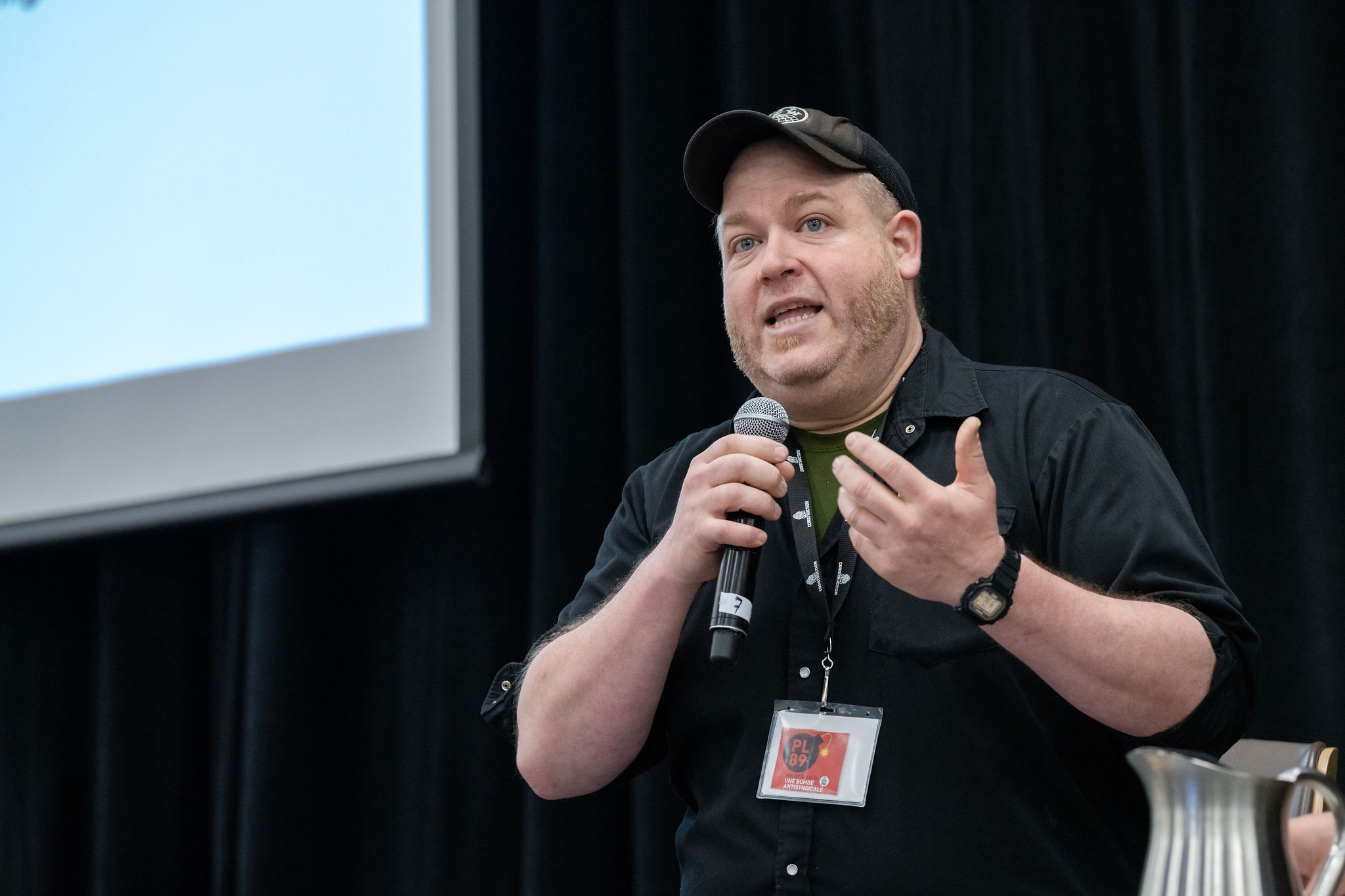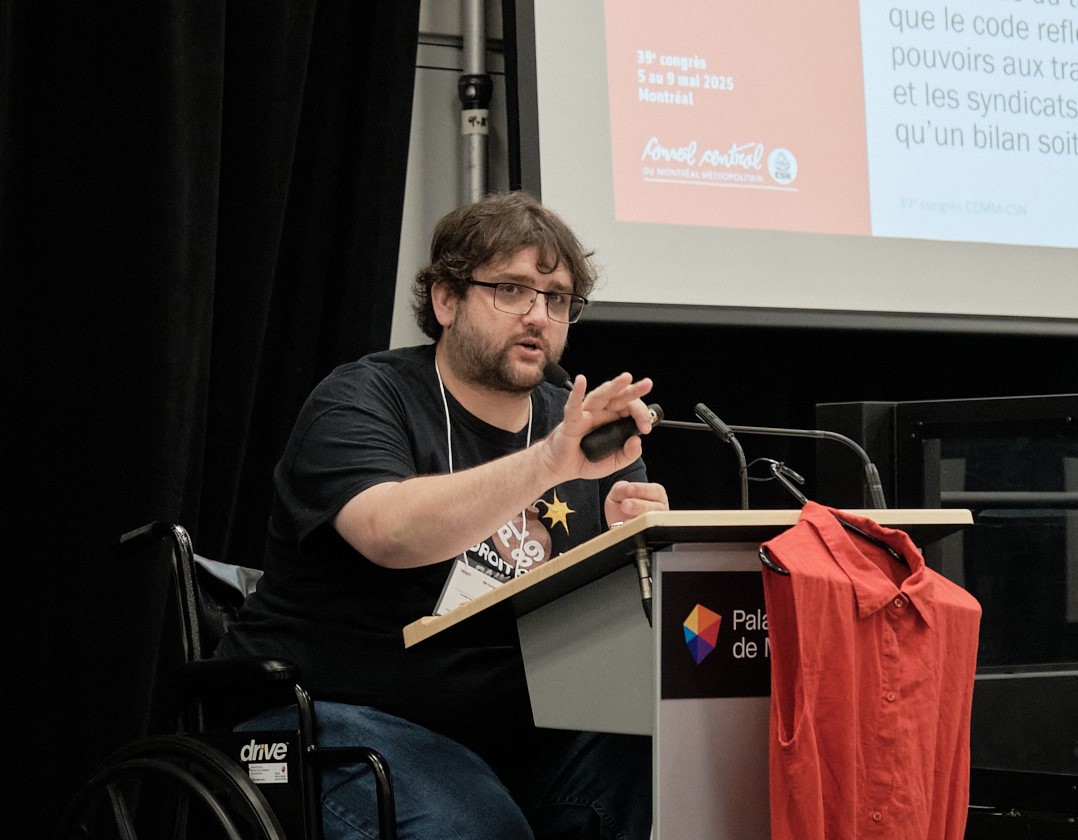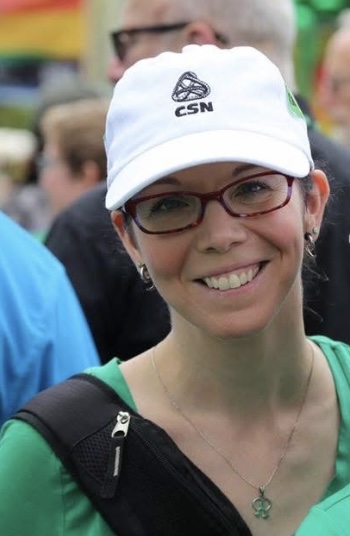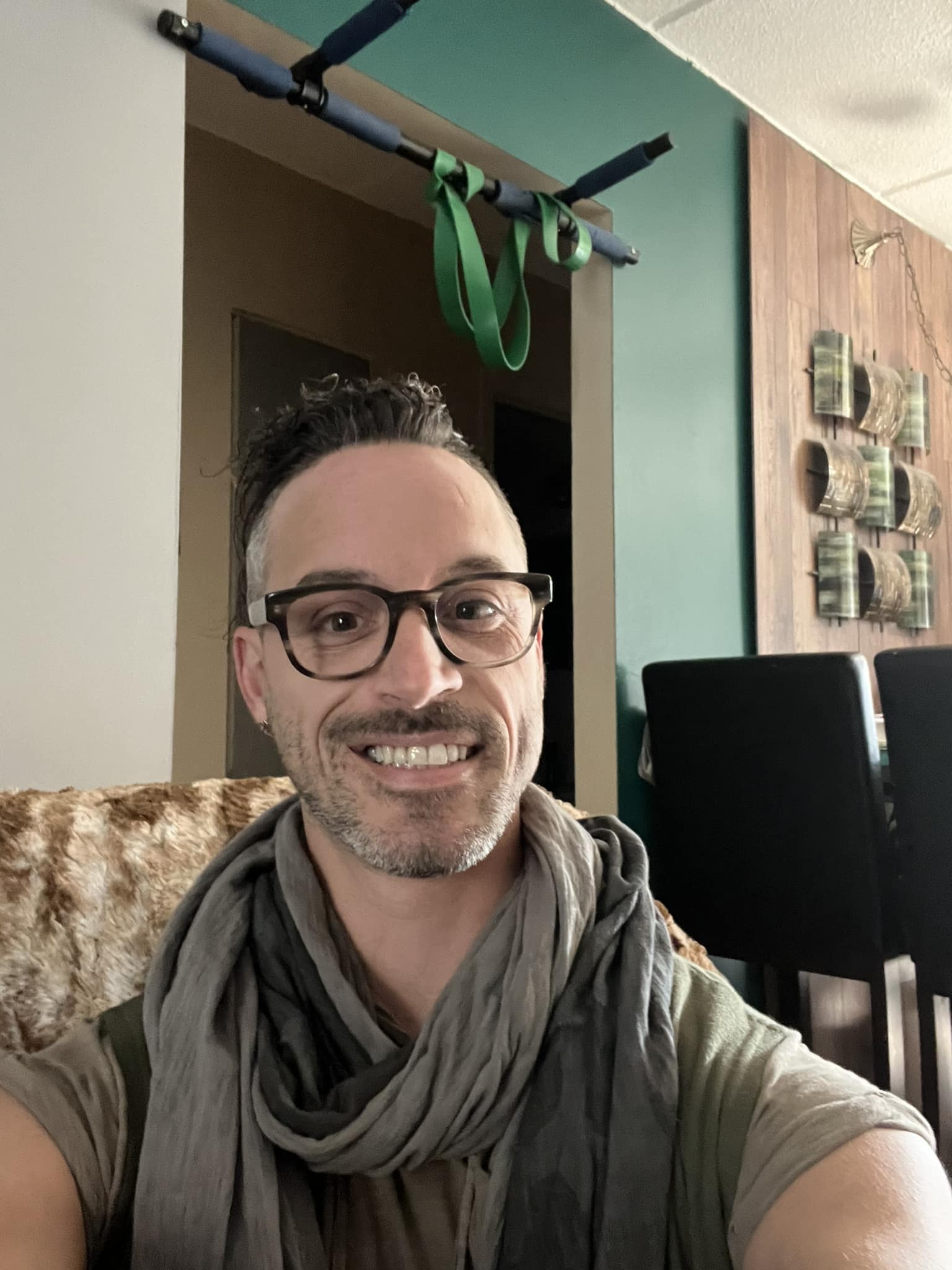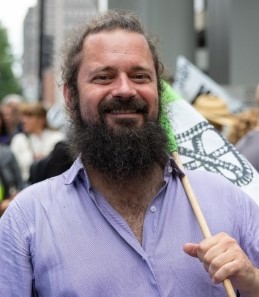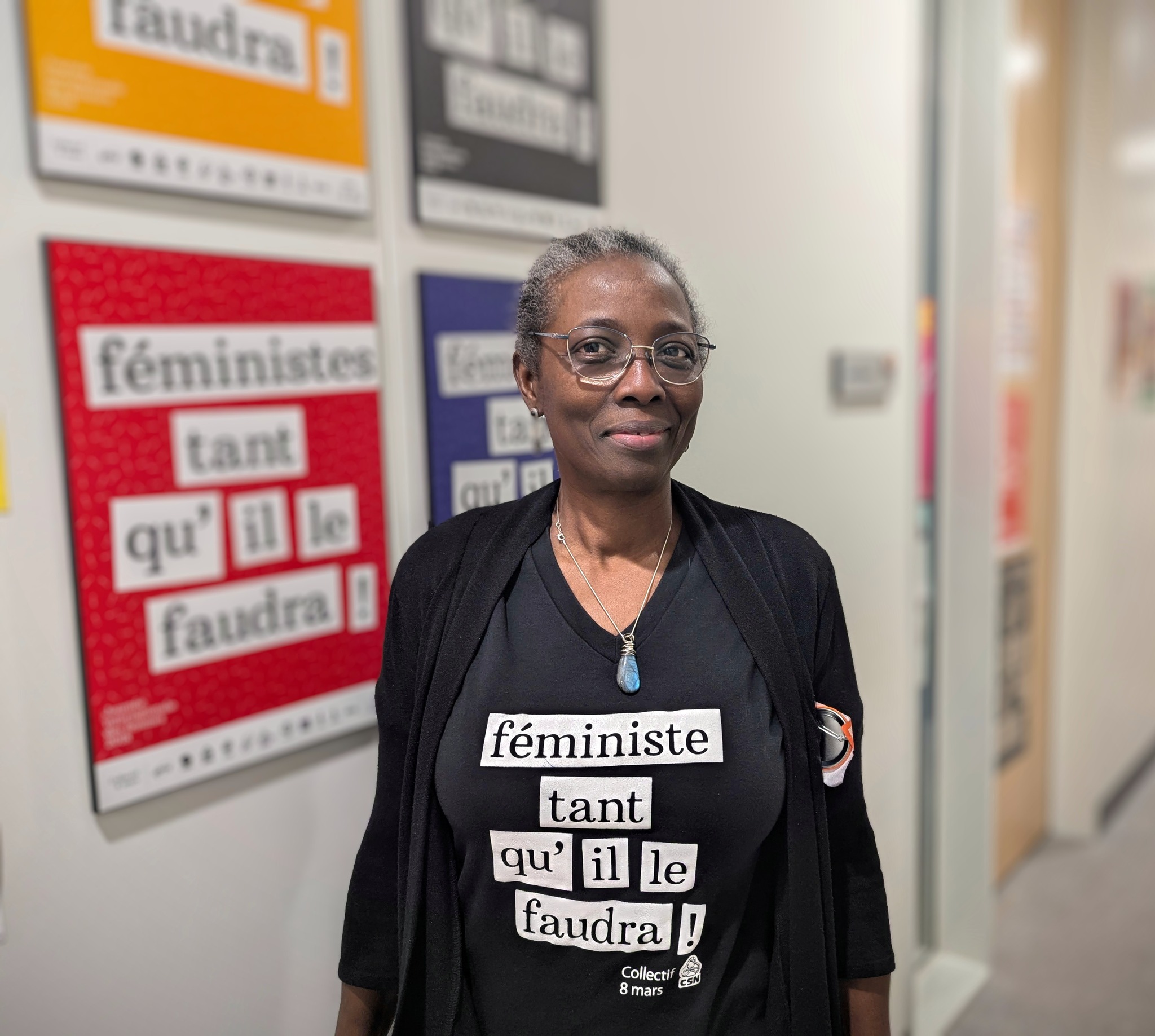About
The Conseil central du Montréal métropolitain–CSN (CCMM–CSN) unites all CSN unions in the Greater Montreal region, Laval, Nunavik and Eeyou Istchee Baie-James. It comprises nearly 400 unions representing over 110,000 members working in all sectors of activity, such as construction, health and social services, communications, manufacturing, education, commerce and more.
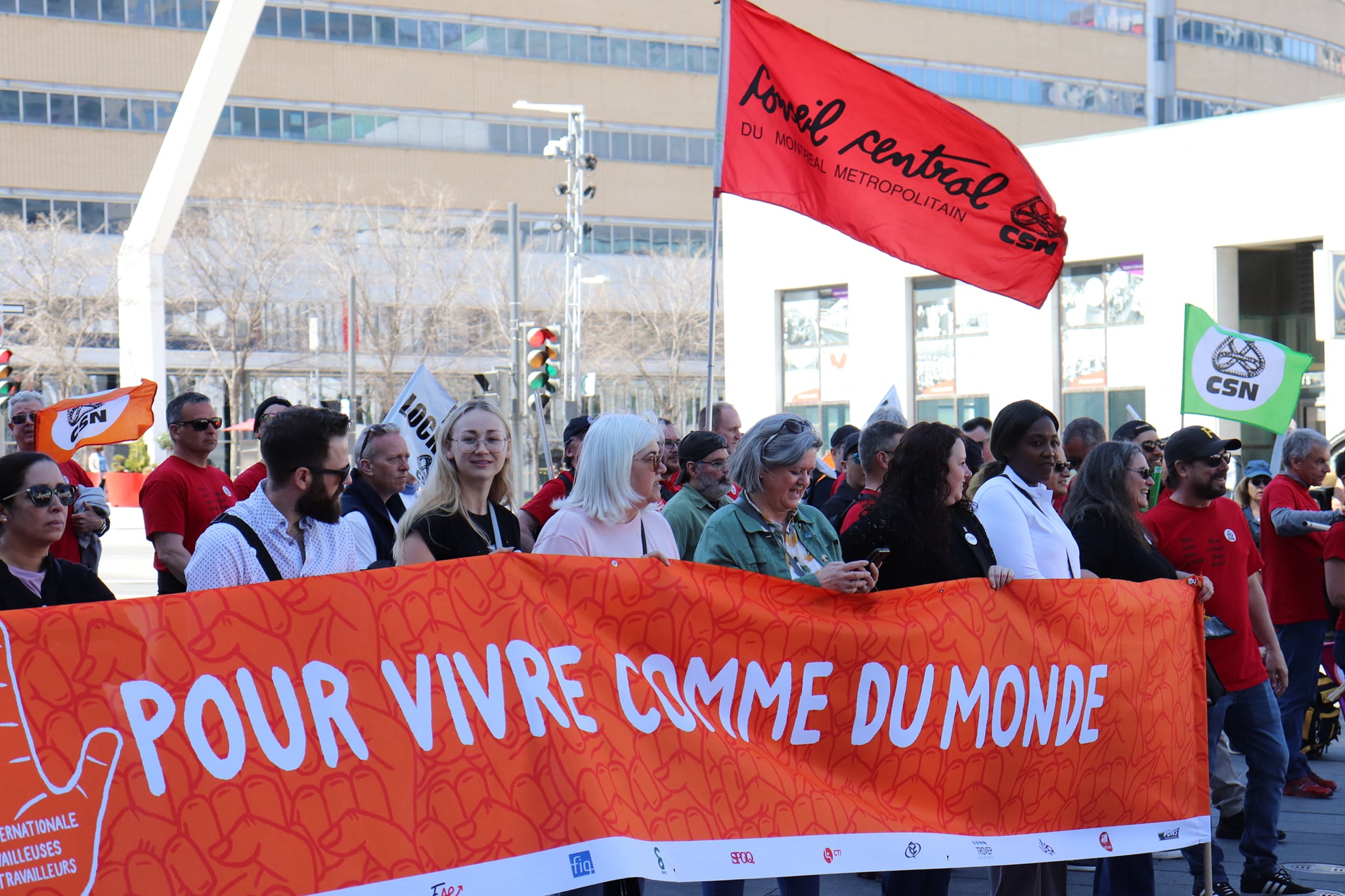
Mission
The CCMM–CSN is committed to advancing the professional, economic, social, political, and cultural interests of its affiliated union members, as well as those of society’s most marginalized groups. It supports unions in negotiating working conditions, fosters solidarity among them, leads union and social campaigns, and develops training programs tailored to members’ specific needs. The CCMM–CSN also works in collaboration and coalition with other regional actors and advocates to public authorities in support of its values and political positions.
In addition, the Conseil central fulfills a role of political representation by participating in various bodies that influence economic, political, and social life.
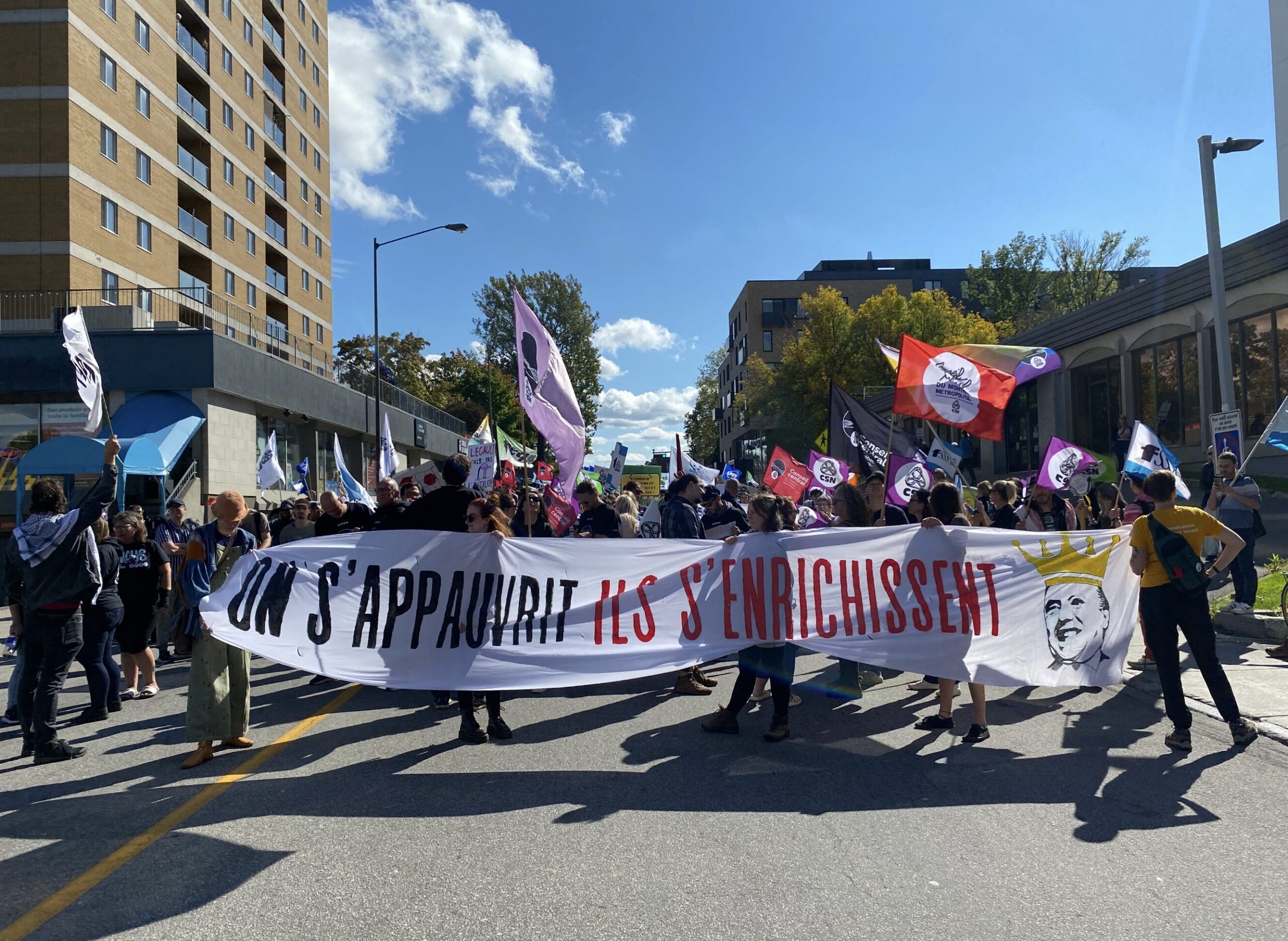
Values
The Conseil central du Montréal métropolitain–CSN opposes all forms of exploitation and advances a social project rooted in democracy, human rights, environmental protection and just transition, social justice, equality, and equity. To this end, it takes action on multiple fronts.
The Work of the CCMM–CSN
A core component of the Conseil central’s mission is supporting unions in struggle, whether during contract renewal or periods of mobilization. Within the CSN, central councils play a key role in strategic analysis, mobilization efforts, and strike organization. In contrast, negotiation and the legal aspects of disputes generally fall under the responsibility of the federation to which a union is affiliated (link). Union advisors assigned to the Conseil central are primarily from the CSN’s Service d’appui aux mobilisations et à la vie régionale (SAMVR). They are supported in their efforts by administrative staff. Their main role is to help unions strengthen their bargaining power, build effective communication networks, and, when needed, provide strategic guidance throughout the course of a conflict.
Training is a cornerstone of the Conseil central’s work. It focuses both on the internal organization of unions, ensuring that elected representatives and union delegates have the skills and knowledge needed to carry out their roles, and on broader political education. This dual approach equips union members with the tools to understand the meaning behind their actions and to engage politically. Dozens of union trainers contribute their experience and expertise to strengthen unions across the region, empowering them to effectively defend their members’ interests.
Beyond its core union work, a significant part of the Conseil central’s efforts, particularly through its elected representatives and committees, focuses on regional political action. Acting independently or in coalition with allied groups, the CCMM–CSN takes public stances on social, political, economic, environmental, and democratic issues to make its voice heard and uphold its principles. These interventions take many forms: public statements, press conferences, demonstrations and mobilizations, participation in regional forums, and seats on boards of directors, among others.
This political action also plays out within the internal structures of the CSN, where the Conseil central regularly intervenes in meetings to influence confederal positions. Given that the interests and political perspectives of CSN-affiliated organizations are not always aligned, these interventions can sometimes lead to lively debate. Such exchanges, particularly during CSN Confederal Council meetings, contribute to the evolution of the confederation’s stances on key issues, as seen in recent years around topics like the environment and free trade.
The CCMM–CSN also carries out ongoing political education and advocacy through its various front committees, which address a wide range of contemporary socio-political issues.
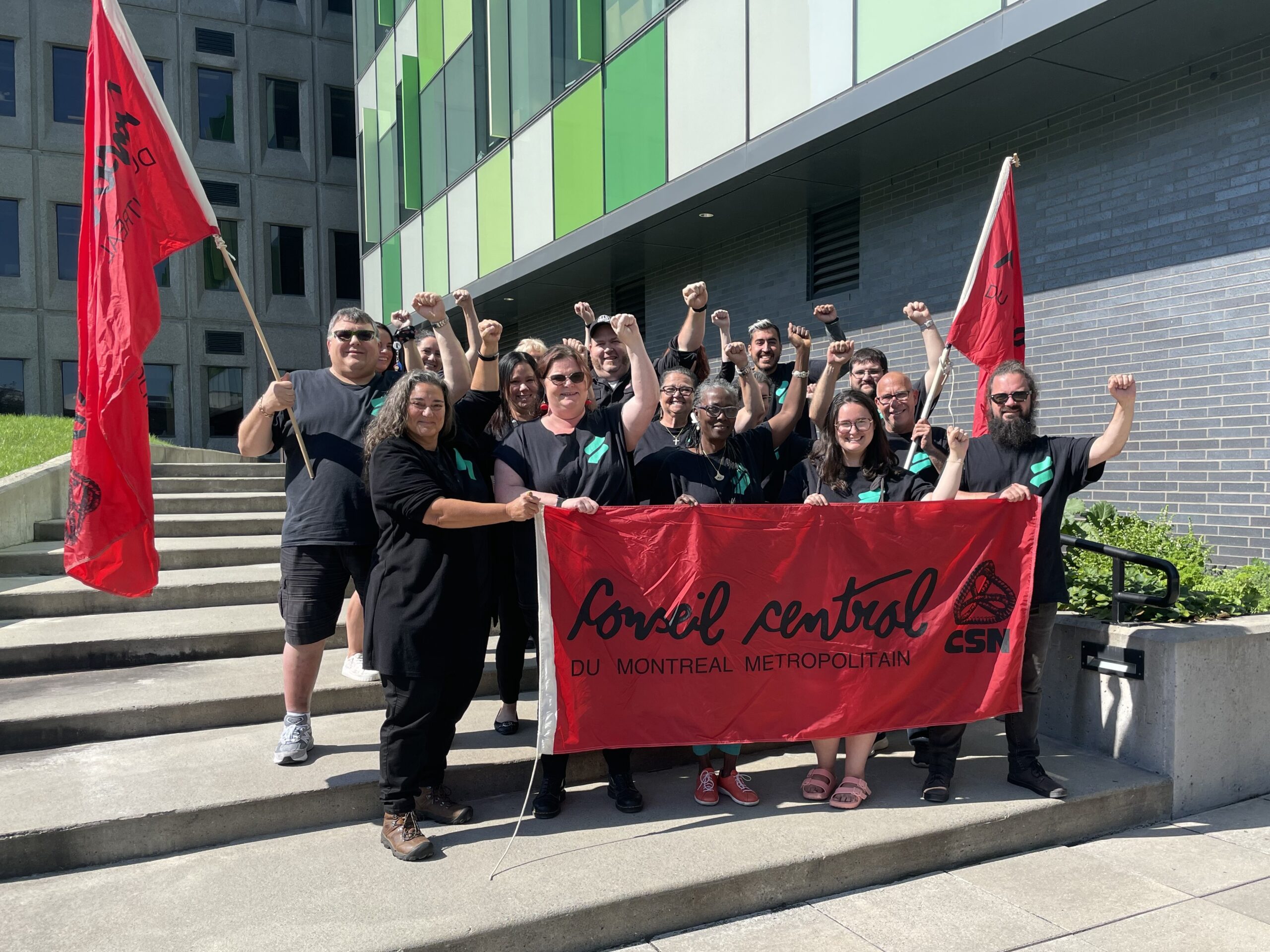
Our Action on Two Fronts
The CCMM–CSN operates on multiple fronts, traditionally summarized as two. The first is union action in the strict sense: the fight for better wages and working conditions. This includes mobilization and training efforts aimed at strengthening workers’ bargaining power. The second front is socio-political in nature, encompassing broader struggles around issues such as the environment, gender equity, and education. This distinction, dating back to Marcel Pepin’s presidency of the CSN in the 1960s, is not absolute. For example, in the public sector, demands related to working conditions (first front) often double as a broader struggle (second front) for better public services for all. For the CCMM–CSN, union action and political action are inseparable. This integrated approach shapes both its vision and its practice.
History
The Conseil central du Montréal métropolitain (CCMM–CSN) is widely recognized as one of the most militant organizations in Quebec’s labour movement. With a rich legacy of union, social, and political struggles, the CCMM–CSN has played a central role in shaping the province’s labour history.
The predecessor of today’s CCMM–CSN was the Conseil central des syndicats catholiques nationaux de Montréal (CCSNM), founded on February 20, 1920, by delegates from six unions: the Syndicat des employés de magasin, Union des travailleurs de la chaussure, Syndicat de Dupuis et Frères, Semi-Ready Tailoring, Syndicat des plombiers, and Syndicat des menuisiers. Their goal was to equip workers with both union and political tools. Less than a year later, the CCSNM had already grown to include 23 unions.
On September 24, 1921, the Conseil central joined delegates from Hull, Quebec City, and Granby to participate in the founding of the Confédération des travailleurs catholiques du Canada (CTCC), which would later become the Confédération des syndicats nationaux (CSN) in 1960. Over time, the Conseil central moved away from the Church. While its early debates were overseen by a chaplain who acted as a moral authority, the organization gradually broke with clerical influence, becoming fully secular by the 1960s.
From the outset, the CCSNM supported workers in their struggle to improve often harsh working conditions in the early twentieth century. It played an active role in several emblematic strikes that left a lasting mark on Quebec’s collective memory, including the 1920s transport workers’ strike against the One Man Car, the Dominion Textile strike in 1946, the historic Asbestos strike in 1949, the Murdochville strike in 1957, the Dupuis Frères strike in 1952, and the 1958 strike by Radio-Canada directors. While some of these conflicts occurred outside the Conseil central’s territory, that did not prevent it from offering its full support to the workers involved.
Over the past half-century, the CCMM–CSN has maintained an openly confrontational stance toward political power, one that has remained unwavering and spares no level of government, whether municipal, provincial, or federal. Its fight against Duplessism in the 1940s was followed by resistance to the reactionary Drapeau administration in Montreal during the 1960s, and by major confrontations with the federal government, notably over the “Lapalme boys” affair, one of the most significant struggles in the Conseil central’s history.
At the municipal level, the CCMM–CSN played a major role in the creation of the Front d’action politique (FRAP). This working-class political party appeared poised for electoral success, had it not been for the imposition of wartime measures during the October Crisis of 1970 and a relentless propaganda campaign by reactionary forces in the region. Notably, two FRAP candidates in the 1970 elections were members of the CCMM–CSN executive.
The formation of the Comité régional intersyndical de Montréal (CRIM), initiated by the Conseil central under the leadership of Michel Chartrand, further reflects the commitment to coalition-building with allied organizations to wield significant political influence in Montreal and the surrounding region.
The status of women has also been a central area of struggle for decades, yielding significant progress. A notable example is the long-running campaign for public daycare, which began in the 1970s. The persistence of activists within the Conseil central committee was instrumental in the establishment, 25 years later, of the network of early childhood centers.
Since the 1970s, the Conseil central has also played a vital role in international solidarity. It spearheaded major campaigns supporting the Chilean people following the 1973 coup d’état, as well as the Palestinian people in their ongoing struggle against Israeli oppression, issues that remain central to the committee’s work. In 1975, the committee launched the Conférence internationale de solidarité ouvrière, which evolved into the Centre international de solidarité ouvrière (CISO), an organization that continues to be highly active today.
Front committees have historically played a significant role in addressing important social issues. For example, activists from the LGBT+ Committee, then known as the gay and lesbian committee, were instrumental in the struggle for the recognition of same-sex spouses and marriage throughout the 1990s and 2000s. Defending the rights of LGBT+ people exemplifies how the actions of CCMM–CSN fronts can profoundly influence the broader CSN: although this cause is now widely supported at the confederal level, it was initially CCMM–CSN delegates who championed the issue and convinced the CSN congress of its importance.
The Status of Women Committee also played a key role in organizing the Bread and Roses March in 1995, which has since evolved into the World March of Women.
In the early 2000s, the committee participated in demonstrations against the Free Trade Area of the Americas (FTAA) during the Quebec Summit in 2001, when over 2,000 activists from CCMM–CSN-affiliated unions gathered in Quebec City to oppose neoliberal hegemony.
More recently, struggles in defense of public services and opposition to austerity measures have sparked the most significant political mobilizations within the CCMM–CSN. Both regional and national campaigns have led to numerous actions, ranging from mass demonstrations to occupations of financial institutions. May 1, 2015, stands out as a particularly important day, with demonstrations and activities taking place across the island of Montreal throughout the day, and some unions even adopting political strike mandates.
In recent years, labour disputes such as those at the Journal de Montréal in 2010, the Hôtel des Gouverneurs de la Place Dupuis and the SAQ between 2016 and 2017, the childcare centers in 2018, and the Front commun in 2023-2024 have involved hundreds, if not thousands, of strikers. These events clearly demonstrate the vital role of the Conseil central in organizing mobilizations, both in scale and intensity.
In recent years, environmental issues have taken a central role. The Environment Committee has been very active, notably through sustained involvement with the Front commun pour la transition énergétique (Common Front for Energy Transition) and by helping organize various actions, including the massive demonstration on September 27, 2019.
Throughout the past century, the Conseil central has often been at the forefront of struggles that have advanced equal rights, social justice, and democracy for all, unionized and non-unionized alike.
One thing is clear: only through unity, solidarity, and the mobilization of all progressive forces in society can we overcome economic and political systems founded on the exploitation of people and nature, inequality, and injustice. In this spirit, the Conseil central du Montréal métropolitain–CSN will continue its struggles in solidarity with all organizations and individuals committed to building a fairer, more inclusive, more democratic, and more ecological society!
- Alfred Charpentier (1920-1922) – Bricklayer
- Didace Pilon (1922-1926) – Auto Body Mechanic
- Clovis Bernier (1926-1931)
- Alfred Charpentier (1931-1935)
- Philippe Girard (1935-1939) – Tramway Company Union
- J.B. Delisle (1939-1942)
- Philippe Girard (1942-1943)
- G.A. Gagnon (1943-1947)
- H. Laverdure (1947-1961) – Bricklayer
- Gérard Picard (1961-1966) – Journalist
- René Cadieux (1966)
- Dollard Généreux (1966-1968) – Electrician
- Michel Chartrand (1969-1978) – Printer
- André Lauzon (1978-1980) – Perkins Paper Mill Worker
- Gérald Larose (1980-1983) – Community Organizer
- Irène Ellenberger (1983-1985) – Visual Designer
- Pierre Paquette (1985-1991) – Teacher
- Sylvio Gagnon (1991-1993) – Canadian Gypsum Worker
- Arthur Sandborn (1993-2006) – Community Organizer
- Gaétan Châteauneuf (2007-2013) – Mechanic at Société de Transport de Montréal (STM)
- Dominique Daigneault (2013-2025) – CEGEP Professor of Social Work Techniques
- Bertrand Guibord (2025-…) – Professor of Philosophy at Cégep Marie-Victorin
Democratic Structure
The Congress is the sovereign governing body of the Conseil central. Every three years, delegates from affiliated unions convene to define the main orientations and priorities of the organization.
Decisions regarding the Conseil central’s actions are made at the monthly General Meeting. This meeting serves as a forum for democratic reflection and union solidarity. Except for January, the General Meeting takes place on the first Wednesday of each month, with a recess in July and August.
Union Council
Composed of members of the executive committee and the heads of the front committees, the Union Council contributes to shaping the general orientations and policies of the Conseil central. It supports union and social struggles by drawing on the expertise and engagement of activists involved in the front committees. Team members may also participate with the right to speak, but not to vote.
Union Council Members
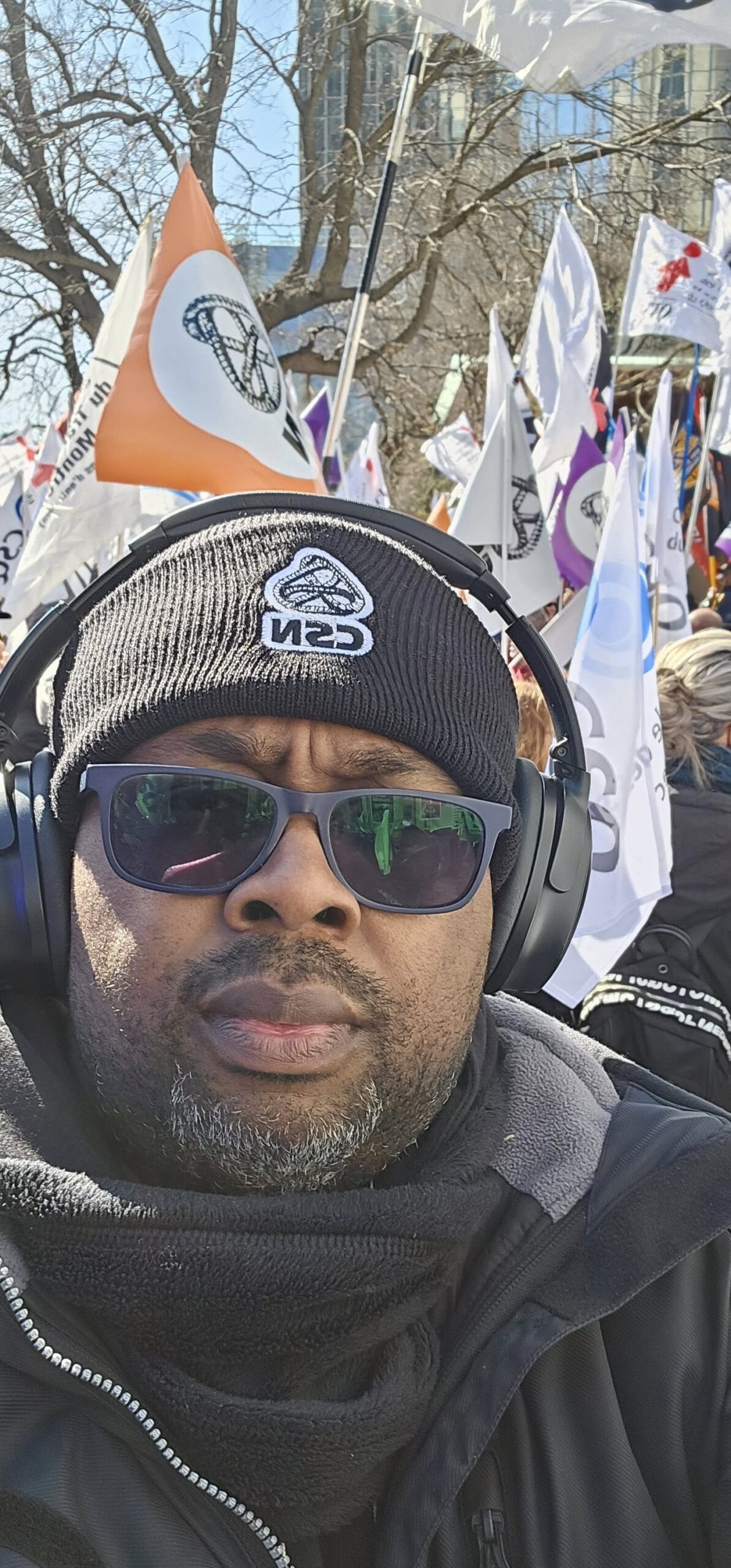
Hardley Hippolyte
Head of the Immigration and Intercultural Relations Committee (CIRI)
Visiter la pageExecutive Committee
On a day-to-day basis, the Conseil central is guided and managed by an Executive Committee. This committee consists of five members elected at the congress: the president, the secretary general, the treasurer, and two vice-presidents. It is responsible for overseeing the development and coordination of the union’s main missions, which include:
- Defending the rights and freedoms of its members
- Promoting equality rights
- Providing political education and training within unions
- Supporting trade union and social struggles
- Organizing campaigns
- Engaging in political action for social progress
- Combating poverty
It consists of:
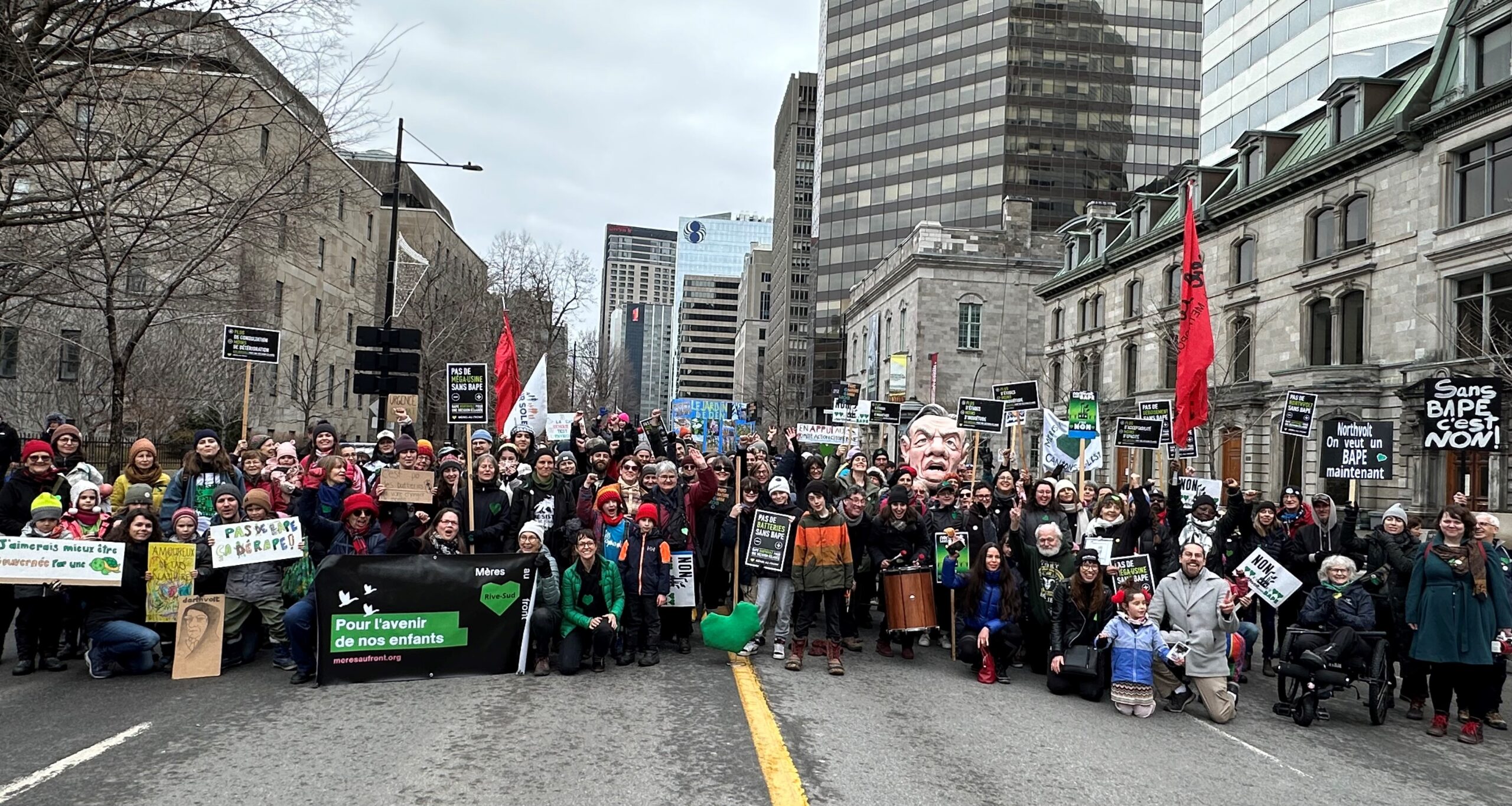
Statutory Committees
Mobilization Committee
The Mobilization Committee is essential to bringing the Conseil central to life, rooting it in the field, and empowering it with the strength of militant unionism! Practically speaking, the committee recommends and implements actions to help achieve the objectives of the CCMM–CSN. It assists in selecting strategic mobilization issues, plans, organizes, and takes part in events, creates and distributes mobilization tools such as posters and leaflets, organizes member outreach, and more.
- Support the implementation of campaigns by the Conseil central and the CSN, and assist in struggles led by local unions in collaboration with the CCMM–CSN team
- Coordinate the merged solidarity and mobilization networks
- Support the organization of mobilizations aligned with the Conseil central’s action plans, considering various alliances
- Promote the widest possible union participation in central council mobilizations
- Participate in and mobilize for central council actions
- Submit proposals and report on activities to the appropriate bodies
- Up to ten (10) activists from unions representing all federations, elected at the first general meeting following the adoption of proposals from the 39th Congress
- One (1) member of the Executive Committee
- One (1) member of the Union Council
- One (1) or two (2) Union Advisors
- One (1) Office Employee
Supervisory Committee
The Supervisory Committee is composed of three members elected by the CCMM–CSN Congress. It meets at least twice a year to audit the accounting books and financial statements. The committee ensures that the budget approved at the congress, as well as any financial decisions made by the General Meeting or the Executive Committee, are thoroughly reviewed. It reports its findings and observations to the Executive Committee, the General Meeting, and the Congress.
Committee members are … (list of members to be inserted)
- Il fait rapport de ses observations au comité exécutif, à l’assemblée générale et au congrès.
- Les membres du comité sont Adrien Doamba, Alain Guy Côté et Yves Duchesneau.

